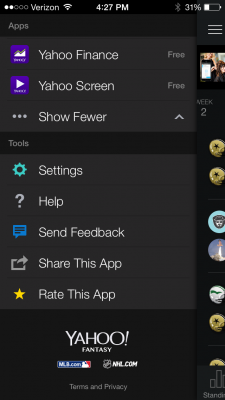Inside the Cash Cow that is Fantasy Football
October 8, 2014
Fantasy football has continuously grown since its conception in the early 1990s, but recently its magnitude has exponentially multiplied. Can it be the savior for a league that has been so downtrodden by seemingly constant off the field issues?

Playing fantasy football has become easier than ever in the advanced technological age we live in. Setting your lineups and making roster moves are all at your fingertips, just one tap away from coming to fruition.
Since the creation of apps made for smartphones, fantasy football has become the ultimate time-killer and has virtually exploded in usage. In 2013, 25.8 million people played fantasy football, a major increase from just two million in 2000, according to quickenloans.com. Given its popularity, it is safe to assume that fantasy football is one key reason that the NFL will not become financially insecure or on the verge of folding for the foreseeable future. No matter how bad the off-the-field issues get, people will still be in the seats, and eyes will still be on the television screen, either to root for their favorite team or to make sure the players they have drafted have a successful day.
In fact, besides simply keeping people watching football and getting involved, fantasy football actually forces fans to watch more games and coverage than they normally would.
“It does affect my viewership in terms of unattractive matchups,” Jon Perez, play-by-play announcer for John Jay College and ESPN3 said. “For instance, the [Pittsburgh] Steelers/[Tampa Bay Buccaneers] game today – I have two Steelers on my team, so there’s an interest in watching that game solely on which player is on my fantasy team.”
Fantasy football also has the power to destroy all of your allegiances and loyalties as a dedicated fan. According to Matthew Critchlow, Fordham College at Lincoln Center (FCLC) ‘15, no real-world NFL rivalry is safe when it comes to fantasy football.
“I’ll even root for the Eagles for a down or two if I need points from one of their players,” Critchlow, a lifelong Giants fan, said. In regards to whether fantasy football affects his viewership, Critchlow added, “A hundred percent. [I’ll] keep track of other games I wouldn’t have any interest in otherwise.”
After all, it’s the perfect way to occupy one’s Monday, Thursday, and of course Sunday. This is because theoretically, one could have players on their fantasy team competing on any of those days at any of the NFL’s scheduled game times. This keeps fans watching not just particular games, but every game all weekend. If not to win and compete against one’s friends, fantasy football at the very least provides the best excuse to procrastinate on that big assignment.
The NFL generates so much revenue off television contracts, advertisements and endorsements that fantasy football only directly contributes a small portion of their $9 billion annual profit. However, the game keeps the casual fan more interested because they feel more vicariously involved and has the really dedicated fan virtually watching every snap of every game.









